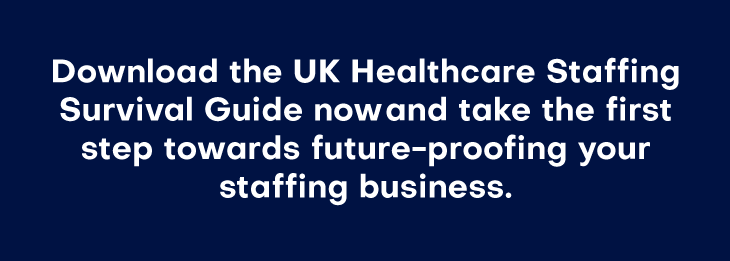Topics: AI, automation, Healthcare Staffing, Outsourcing, Talent Acquisition, UK
Outsourcing for Growth: How to Scale Your Healthcare Staffing Business with Flexibility
Posted on August 30, 2024
Written By Abishek Balakumar

7 in 10 UK B2B companies are now outsourcing key business operations. This trend underscores a critical pain point—organisations are increasingly reliant on outsourcing to manage costs and enhance operational efficiency. In a climate where 57% of outsourcing customers cite cost reduction as their primary motivation, the urgency to cut expenses has never been more pronounced. Moreover, the global outsourcing market is projected to generate $769.7 billion in 2024, reflecting a robust growth trajectory of 5.54% annually until 2027. This growth is not merely a reflection of market expansion but also of the pressing need for businesses to streamline operations and access specialized expertise.
The staffing industry in the UK is also witnessing a significant transformation. By the end of 2024, the UK is expected to generate $35.51 billion in IT outsourcing revenue alone, which represents a 9.41% growth from previous years. This positions the UK as a leader in the European outsourcing market, highlighting the critical role of outsourcing healthcare staffing in supporting business scalability and flexibility.
As companies navigate these challenges, the statistics paint a stark picture of the current landscape:
- 34% of B2B organizations in the UK outsource IT support, making it the most commonly outsourced service, followed closely by payroll and accounting at 28% and 24%, respectively.
- The business process outsourcing (BPO) sector is projected to grow by over 9% per year through 2030, driven by the need for improved efficiency and cost management across various industries.
- Notably, 60% of companies plan to reassess their outsourcing strategies within the next year, indicating a growing recognition of the need for adaptability in a fluctuating market.
As organizations confront the dual pressures of rising operational costs and the demand for innovation, the reliance on outsourcing is poised to become even more pronounced. This landscape not only highlights the challenges businesses face but also underscores the critical importance of strategic outsourcing in achieving long-term success and sustainability.
Strategies for Scaling Your Healthcare Staffing Business Through Outsourcing
Here are unique, data-driven strategies that healthcare staffing firms can adopt to enhance their operations and position themselves for success in the evolving landscape.
1. Invest in Advanced Technology and AI Solutions
The integration of advanced technologies and AI is no longer optional; it’s essential for maintaining competitiveness. According to the Staffing Industry Analysts (SIA), 60% of staffing firms plan to increase their investment in AI and automation within the next year.
- AI-Driven Recruitment: Implement AI tools to enhance candidate sourcing and screening processes. For instance, AI can analyse resumes and match candidates to job descriptions with up to 90% accuracy, significantly reducing time-to-hire.
- Predictive Analytics: Utilize predictive analytics to forecast staffing needs based on historical data and current trends. This approach can help firms anticipate demand fluctuations, allowing for proactive talent acquisition and reducing the risk of understaffing during peak periods.
2. Leverage Recruitment Services
Recruitment Support has gained traction as a viable solution for accessing a broader talent pool while maintaining operational efficiency. The Everest Group projects that the RPO market will grow by 15% annually over the next three years, underscoring its increasing importance.
- Global Talent Access: By partnering with Recruitment service providers, healthcare staffing firms can tap into international talent pools, addressing domestic shortages effectively. This strategy can reduce time-to-fill positions by 40%and enhance workforce diversity.
- Scalability: Recruitment solutions allow firms to scale recruitment efforts up or down based on market demand, ensuring that they can respond quickly to changes in healthcare needs without incurring unnecessary costs.
3. Outsource Non-Core Functions Strategically
Outsourcing non-core functions can lead to significant cost savings and operational efficiencies. According to APSCo, 75% of staffing firms have increased their use of outsourcing in the past year.
- Specialized Outsourcing: Focus on outsourcing functions such as payroll, compliance, and administrative tasks to specialized providers. This can lead to a 30% reduction in overhead costs, allowing staffing firms to allocate resources more effectively to core activities.
- Enhanced Compliance Management: Outsourcing compliance management to experts can mitigate legal risks and ensure adherence to evolving healthcare regulations, which is crucial in a sector facing scrutiny and regulatory changes post-Brexit.
4. Adopt Lean Operational Models
In the face of rising operational costs, adopting lean operational practices can help healthcare staffing firms maintain profitability. The Healthcare Financial Management Association notes that companies can achieve a 15% reduction in operational costs through lean practices.
- Process Optimization: Streamline workflows and eliminate wasteful practices to enhance efficiency. This includes renegotiating supplier contracts and leveraging technology to automate routine tasks.
- Cost Management Strategies: Regularly assess financial strategies to identify areas for improvement. Implementing cost-sharing arrangements with partners can also alleviate financial pressures.
5. Focus on Continuous Learning and Adaptation
The dynamic nature of the healthcare staffing industry necessitates a commitment to continuous learning and adaptation. A recent report from McKinsey indicates that organizations prioritizing data-driven decision-making are 23 times more likely to acquire customers and 6 times more likely to retain them.
- Training Programs: Invest in ongoing training and development for staff to ensure they are equipped to handle new technologies and processes. This not only enhances service quality but also fosters employee engagement and retention.
- Market Intelligence: Utilize market intelligence tools to monitor industry trends and competitor actions. This can inform strategic decisions regarding service offerings, pricing strategies, and growth opportunities.
By implementing these unique, data-driven strategies, healthcare staffing firms can effectively navigate the challenges posed by the current market while positioning themselves for sustainable growth and flexibility. Embracing innovation, prioritizing efficiency, and leveraging strategic partnerships will be key to thriving in the evolving landscape of UK healthcare staffing. As the industry continues to change, those firms that adapt and invest wisely will emerge as leaders, ensuring the delivery of quality care amidst ongoing economic and operational pressures.
Originally published Aug 30, 2024 11:08:33, updated Sep 09 2024
Topics: AI, automation, Healthcare Staffing, Outsourcing, Talent Acquisition, UK








